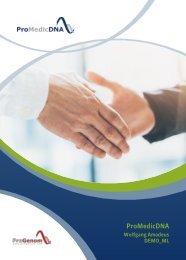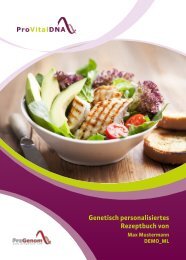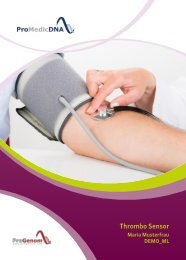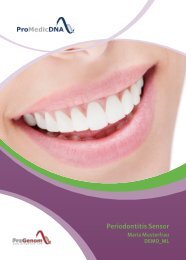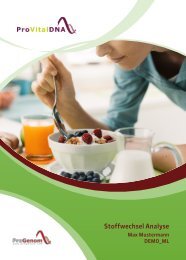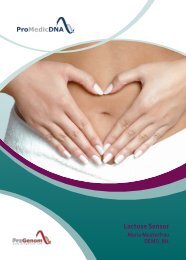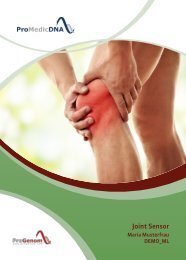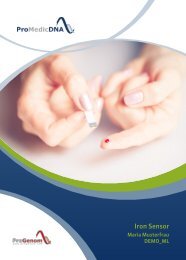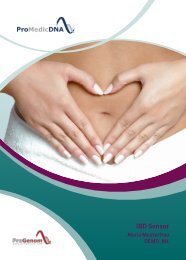ProVitalDNA - Package - DEMO EN
non-medical analysis - ProVitalDNA
non-medical analysis - ProVitalDNA
You also want an ePaper? Increase the reach of your titles
YUMPU automatically turns print PDFs into web optimized ePapers that Google loves.
COMT - Catechol-O-methyltransferase (rs4680)<br />
The enzyme catechol-O-methyltransferase (COMT) can inactivate various substances (epinephrine, norepinephrine, and<br />
dopamine) and perform the reduction. In addition, COMT may inhibit the effect of various drugs. The COMT rs4680 polymorphism<br />
is associated with psychological disorders, such as schizophrenia, eating disorders and alcoholism.<br />
RES Genotype POP Possible results<br />
A/A 15% No effect<br />
Increased risk of alcoholism<br />
Associated with insufficient breakdown of epinephrine, norepinephrine and dopamine<br />
X A/G 44% Increased risk of schizophrenia when cannabis is consumed under the age of 16 years (OR: 2.5)<br />
Normal risk of alcoholism<br />
References<br />
G/G 41% Increased risk of schizophrenia when cannabis is consumed under the age of 16 years (OR: 10.9)<br />
Normal risk of alcoholism<br />
Caspi et al. Moderation of the effect of adolescent-onset cannabis use on adult psychosis by a functional polymorphism in the catechol-Omethyltransferase<br />
gene: longitudinal evidence of a gene X environment interaction. Biol Psychiatry. 2005 May 15,57(10):1117-27.<br />
Kauhanen J et al. Association between the functional polymorphism of catechol-O-methyltransferase gene and alcohol consumption among social<br />
drinkers. Alcohol Clin Exp Res. 2000 Feb,24(2):135-9.<br />
Hursel R et al. The role of catechol-O-methyl transferase Val(108/158)Met polymorphism (rs4680) in the effect of green tea on resting energy<br />
expenditure and fat oxidation: a pilot study. PLoS One. 2014 Sep 19,9(9):e106220.<br />
Smith SB et al. Epistasis between polymorphisms in COMT, ESR1, and GCH1 influences COMT enzyme activity and pain. Pain. 2014 Nov,155(11):2390-9.<br />
Tammimäki A et al. Catechol-O-methyltransferase gene polymorphism and chronic human pain: a systematic review and meta-analysis.<br />
Pharmacogenet Genomics. 2012 Sep,22(9):673-91.<br />
T Wang et al. Association study of the low-activity allele of catechol-O-methyltransferase and alcoholism using a family-based approach. Mol<br />
Psychiatry. 2001 Jan,6(1):109-11.<br />
Tiihonen J et al. Association between the functional variant of the catechol-O-methyltransferase (COMT) gene and type 1 alcoholism. Mol Psychiatry.<br />
1999 May,4(3):286-9.<br />
CYP1A2 - cytochrome P450, family 1, subfamily A, polypeptide 2 (rs762551)<br />
The heme protein cytochrome P450-1A2 (CYP1A2) belongs to the group of cytochrome P450 enzymes, and metabolizes various<br />
xenobiotic substances (including caffeine), medications, and estrogens. The polymorphism rs762551 is associated with the risk of<br />
breast cancer.<br />
RES Genotype POP Possible results<br />
X A/A 41% Caffeine is broken down normally<br />
The consumption of 2 or more cups of coffee per day delays the appearance of breast cancer with<br />
approximately 7 years (59.8 years instead of 52.6 years).<br />
References<br />
A/C 44% Caffeine is broken down slowly<br />
Coffee consumption does not influence the appearance of breast cancer<br />
C/C 15% Caffeine is broken down slowly<br />
Coffee consumption does not influence the appearance of breast cancer<br />
Bågeman et al. Coffee consumption and CYP1A2*1F genotype modify age at breast cancer diagnosis and estrogen receptor status. Cancer Epidemiol<br />
Biomarkers Prev. 2008 Apr,17(4):895-901.<br />
"Caffeine". DrugBank. University of Alberta. 16 September 2013. Retrieved 8 August 2014.<br />
Sachse C et al. Functional significance of a C-->A polymorphism in intron 1 of the cytochrome P450 CYP1A2 gene tested with caffeine. Br J Clin<br />
Pharmacol. 1999 Apr,47(4):445-9.<br />
LEG<strong>EN</strong>D: RES = your personal analysis result (marked with an X), G<strong>EN</strong>OTYPE = different variations of the<br />
gene (called alleles), POP = percent of the general population that have this genetic result, POSSIBLE<br />
RESULTS = influence of the genetic variation.<br />
<strong>DEMO</strong>_ML Page 258 of 295




